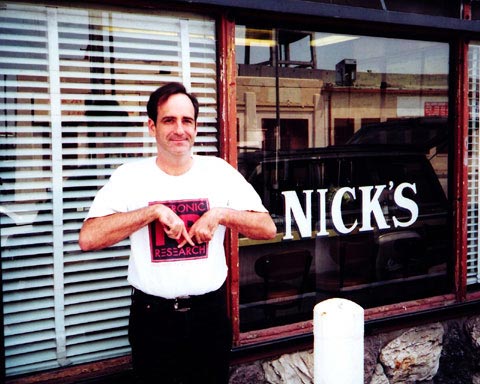|
INNERVIEW
Cole Coonce
By Darr Hawthorne
Photo by the author

Cole Coonce justifiably will get the credit
for the first drag racing-oriented magazine
on the Internet. Years before DRO magazine came
around Coonce started and maintained his magazine
called "Nitronic Research," along
with a chat room he titled "Header Flames."
His dedication to the Nostalgia Top Fueler gained
him cult icon status in the nostalgia drag racing
community. In recent years he has spent less
and less time with Nitronic Research and more
on writing and other interests. Recently he
closed the site down permanently, much to the
dismay of his loyal followers. DRO decided this
pioneer warranted a few more minutes in the
drag racing limelight before we let him move
on and sent our ace left coast correspondent,
Darr Hawthorne, to give the Coonster his exit
innerview.
DRO: How did you
get exposed to drag racing?
COONCE: I was
born in Hollywood, California, but I spent my
cavity prone years in the deep south at age
13 and beyond. It was kind of harsh because
I grew up drag racing in Southern California
till I was 13 and then it was kind of taken
away. I moved back to California when I was
almost beer drinking age and that is when drag
racing came back into my life. I had an uncle
who had a Junior Fuel Dragster and I'd run it
out at San Fernando every Sunday afternoon and
sometimes at Lions -- you know a PDA meet or
something like that. I rode in a pick-up truck
out to the drag races. I thought everybody had
an uncle that was a dragster driver.
DRO: Did you go away from drag racing and then come back with some catalyst that made you pay attention to drag racing?
CC: It was a geographical split more than anything else, because drag racing wasn't as prevalent in Mississippi where I spent my teenage years. It was really hard to find. I remember I drove from Mississippi when I was a high school senior to the U.S. Nationals, but other than that it was really hard to take it in. It was even hard to find magazines on the stands in the Deep South. When I came back to California I started going out to Pomona, and Garlits was in the mix with Amato and stuff. It was so great just to see it again, see fuel cars, but that was in the early '80s and towards the end of the '80s it just started getting strange again. To me it was like when Dick LaHaie was in the hunt or Top Fuel Champion of the world NHRA Top Fuel Champion, or whatever they called it then. But then Dick LaHaie couldn't do it anymore because he didn't have enough war bucks behind him, corporate war bucks. To me it made it a lot less interesting on a human level, so that is when it started to sour for me personally. If you're looking for a watershed moment, it's when Dick LaHaie said, "I can't do this anymore on this level."
DRO: Then you started noticing that there was an interest in recreating some form of nostalgic drag racing?
CC: Yeah, well it was really strange. The front
engine fuel stuff was happening on a really
small level and I remember going out to Palmdale
because I had heard there was some nostalgia
race down there, and sitting in the grandstands.
There were 19 people there and the guy next
to me was Jim Scott, the old announcer from
the San Fernando Raceway. So that was kind of
dispelled or debunked that Thomas Wolfe notion
of, "You Can Never Go Home Again." Of course,
you go home again and some of it is completely
sandblasted, godforsaken, drag strip in the
middle of the Mojave Desert with 19 other nut
cases, and you go, "Wow, I'm home," and that
was enough. That was enough philosophically
or spiritually which is like very satisfying,
you know. A friend of mine and I drove to Bakersfield
to watch a stock car race and there were like
seven people in the stands sometimes and a lot
of them would be popular drivers with their
stuff blowing out the round before or whatever
and you would go, "Wow."

|